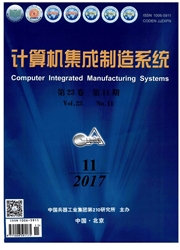

 中文摘要:
中文摘要:
为提高叶片尺寸精度及表面质量,针对气体的可压缩性、阀的死区效应、阀的流量非线性、气缸摩擦力和测量噪声等干扰因素对叶片抛光力控制精度的影响,提出了一种基于干扰观测器的反向传播神经网络比例—积分—微分控制方法。该方法通过构造干扰观测器来预测抛光力气动控制系统中的非线性干扰,并在控制中引入等效的补偿来抑制干扰,同时利用反向传播神经网络控制算法对比例—积分—微分控制参数进行在线自适应整定。仿真分析和实验结果表明,基于干扰观测器的反向传播神经网络比例—积分—微分控制器具有控制精度高、鲁棒性强、抑制干扰能力强等优点,能够提高叶片型面尺寸精度和表面一致性、降低表面粗糙度、减小残余应力并提高抛光效率。
 英文摘要:
英文摘要:
To improve the dimensional accuracy and surface quality of blade, a Back Propagation (BP) neural network Proportional Integral Derivative (PID) control method based on disturbance observer was proposed aiming at the influence of gas compressibility, valve dead-time effect, valve nonlinear flow, cylinder friction, measurement noise and other interference factors on the control precision of blade polishing force. This method predicted nonlinear interference in the polishing force pneumatic control system by constructing a disturbance observer, and the equivalent compensation was introduced to suppress the interference. Simultaneously, BP neural network control algorithm was used to adjust PID control parameters online adaptively. Simulation analysis and experimental results showed that BP neural network PID controller based on disturbance observer had high control precision, strong robustness, strong interference suppression ability and other advantages compared with the traditional PID controller, and it could improve the blade profile dimensional precision and surface consistence, reduce the surface roughness, decrease the residual stress and improve the polishing efficiency.
 同期刊论文项目
同期刊论文项目
 同项目期刊论文
同项目期刊论文
 期刊信息
期刊信息
